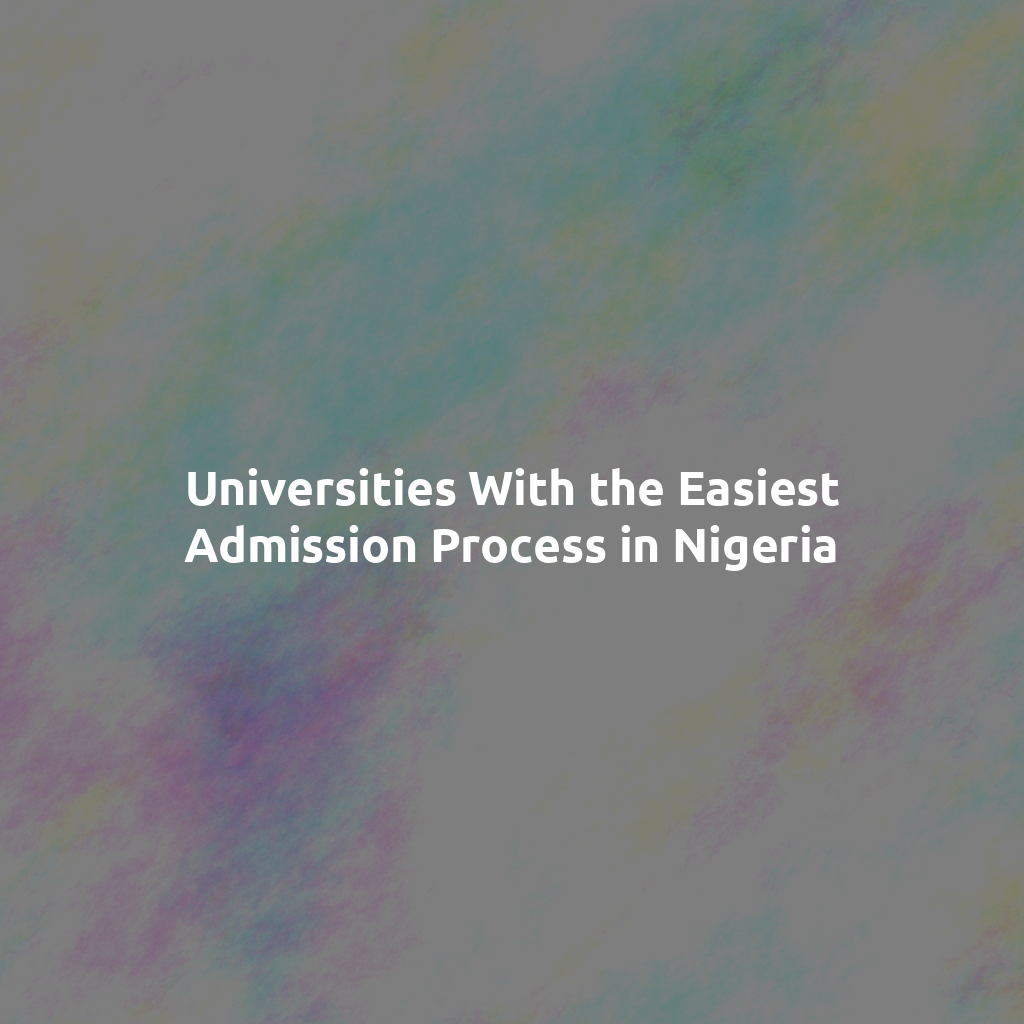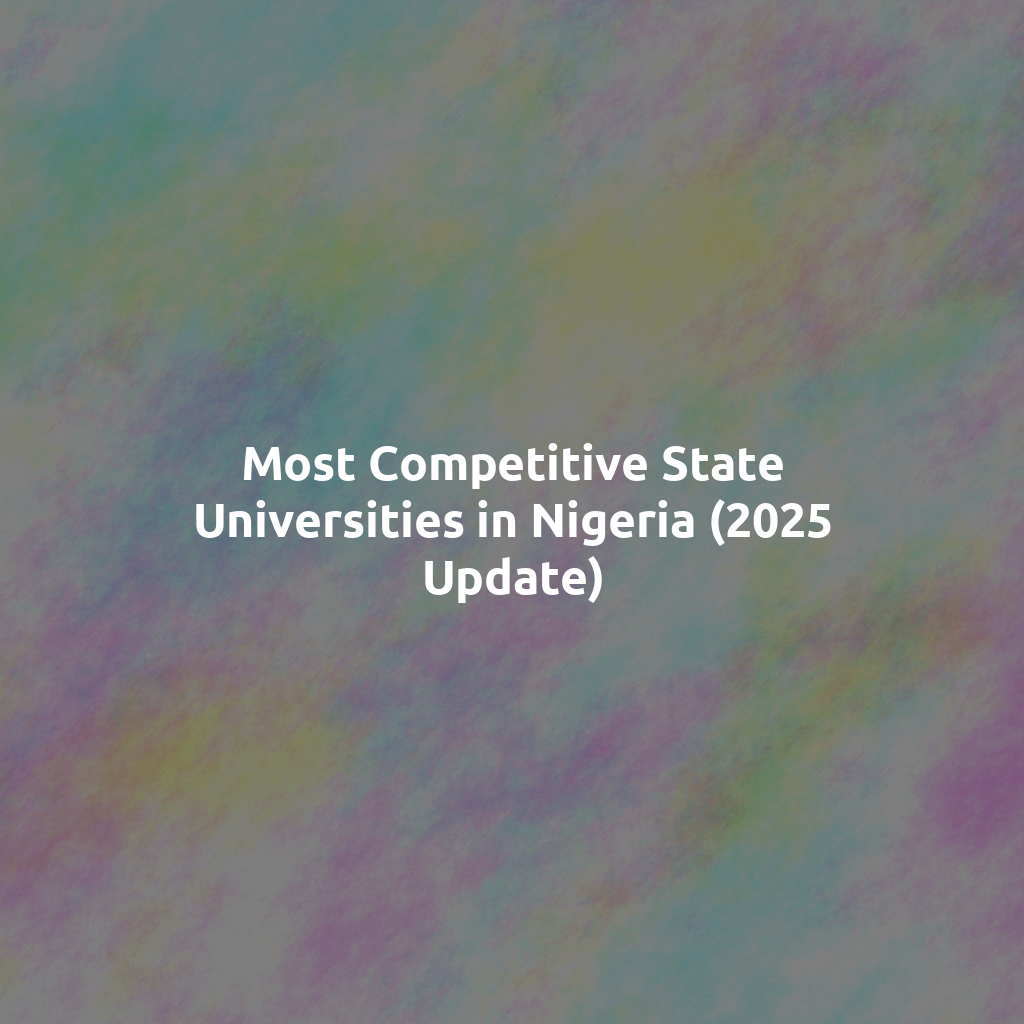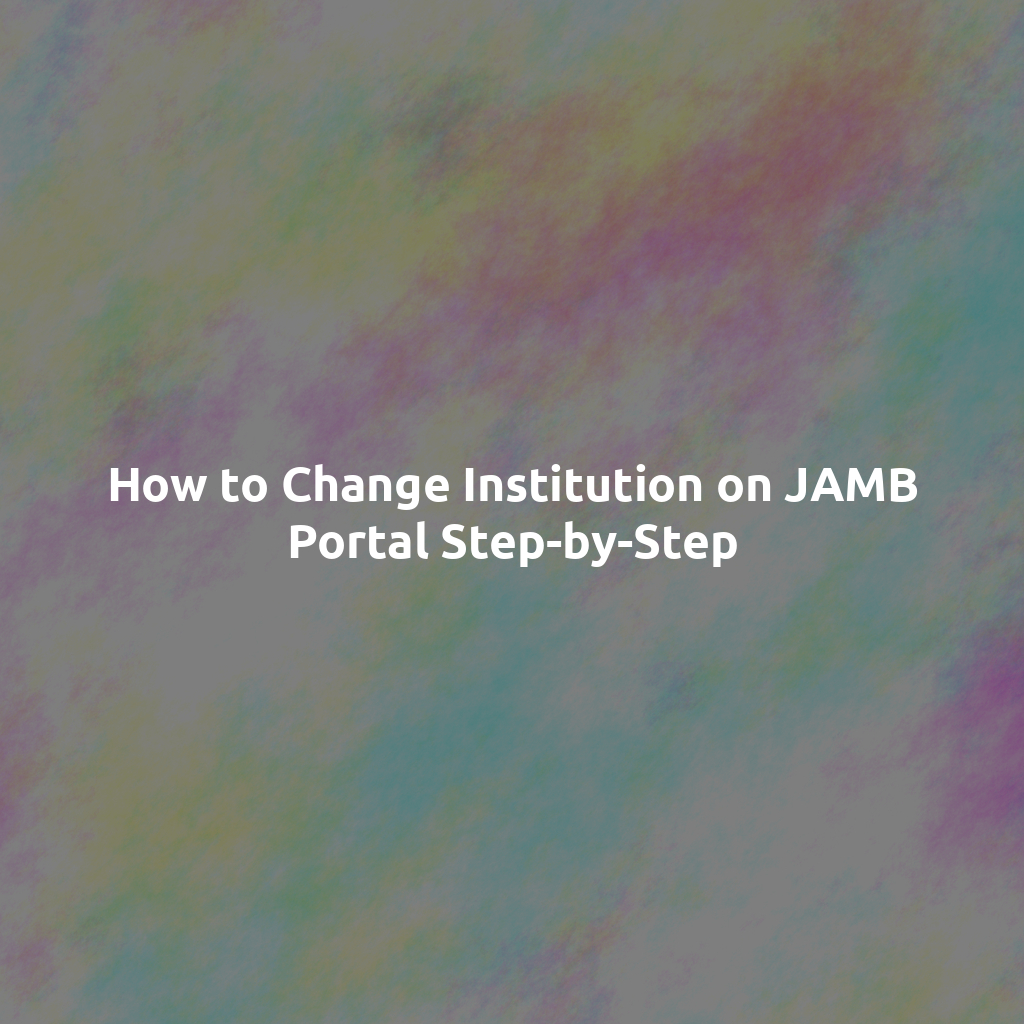Overview of the Nigerian University Admission Process
The Nigerian university admission process can be challenging for many students.
Each year, numerous applicants seek admission into various universities across the country.
Understanding this process is essential for aspiring candidates.
Initial Requirements
First, candidates need to possess a valid West African Examinations Council (WAEC) result.
This result should include credits in relevant subjects, including English and Mathematics.
Advertisements
Moreover, other qualifications like the National Examination Council (NECO) result are also accepted.
Unified Tertiary Matriculation Examination
Next, candidates must register for the Unified Tertiary Matriculation Examination (UTME).
This central exam evaluates applicants’ readiness for university education.
Candidates choose their preferred universities during the registration process.
Post-UTME Screening
After UTME, many universities conduct a post-UTME screening exercise.
This additional assessment usually requires candidates to show proof of their UTME scores.
It may involve written exams or oral interviews, depending on the institution.
Admission Lists
Upon successful completion of assessments, universities release admission lists.
Candidates can check these lists online or through designated offices.
Successful candidates receive admission letters, detailing their next steps.
Acceptance and Registration
Upon receiving an admission offer, students must accept it promptly.
Advertisements
This involves paying an acceptance fee to secure their spots.
Afterward, they must complete necessary registration procedures at the university.
Challenges in the Admission Process
Various challenges can arise during the admission process in Nigeria.
Delays in results or technical issues at examination centers are common.
Furthermore, competition for limited spaces at popular universities adds pressure.
Importance of Planning
Effective planning can greatly enhance a candidate’s chances of admission.
Researching universities and their specific requirements is crucial.
Additionally, early preparation for the UTME can lead to better results.
Criteria for Easy Admission in Nigerian Universities
Open Admission Policy
Many universities in Nigeria offer open admission policies.
This policy allows more students to gain admission without stringent requirements.
Consequently, students with diverse academic backgrounds can apply.
Less Competitive Entrance Examinations
Some institutions use less rigorous entrance exams.
This approach reduces the pressure on prospective students.
Essentially, it creates opportunities for students who may struggle with standardized tests.
Flexible Application Deadlines
Flexibility in application deadlines aids many candidates.
It allows students to apply even if they miss the initial deadlines.
Thus, late applicants can pursue their educational goals.
Lower Academic Requirements
Institutions with lower academic requirements attract more applicants.
This accessibility encourages students with different academic performances to apply.
As a result, students with average results can still secure admission.
Supportive Admission Counseling
Various universities provide admission counseling services.
These services guide students through the application process.
Moreover, they help clarify admission requirements and procedures.
Community Engagement Programs
Universities engaged in community programs often attract local applicants.
These programs create a supportive environment for prospective students.
Thus, students feel more connected to the institution.
Easy Transfer Policies
Some universities permit easy transfers between programs.
This flexibility aids students who may wish to switch their field of study.
Consequently, it retains students who may have initially enrolled in unsuitable programs.
Financial Aid Opportunities
Universities that offer financial aid have an edge in attracting applicants.
Many students seek institutions with scholarships and grants.
Therefore, financial support plays a significant role in the admission process.
Universities Known for Lenient Admission Processes
Overview of Admission Practices
Many universities in Nigeria have streamlined their admission processes.
These institutions often prioritize accessibility for prospective students.
As a result, more students can enroll in higher education.
Criteria for Lenient Admissions
Lenient admission processes often include fewer requirements.
For instance, some schools accept lower JAMB scores.
Additionally, they may allow alternate qualifications.
This flexibility opens doors for a broader range of applicants.
Institutions Noted for Easy Admissions
- University of Benin
- Abia State University
- Nnamdi Azikiwe University
- University of Lagos
- Ambrose Alli University
University of Benin
This university is known for its relatively simple admission criteria.
It offers various programs that attract many applicants.
Abia State University
Abia State University emphasizes inclusivity in its admission policy.
It regularly updates its programs to meet student needs.
Nnamdi Azikiwe University
This institution has flexible entry requirements for its courses.
It encourages students from diverse backgrounds to apply.
University of Lagos
University of Lagos provides multiple pathways for admission.
It frequently holds outreach programs to assist prospective students.
Ambrose Alli University
This university simplifies its application process significantly.
It focuses on empowering students from various educational backgrounds.
Comparison of Admission Requirements Across Top Universities
General Admission Procedures
Most universities in Nigeria require candidates to complete an application form.
Students must pay an application fee during this process.
Additionally, candidates must provide relevant academic transcripts.
Universities may also need letters of recommendation from teachers.
Some schools require candidates to submit a personal statement.
Undergraduate Admission Requirements
Undergraduate programs typically require WAEC or NECO results.
Students must achieve a minimum score in relevant subjects.
Some universities conduct entrance examinations in addition to their tests.
Interviews may be part of the admission process for certain courses.
Prospective students should check specific departmental requirements.
Postgraduate Admission Requirements
Postgraduate applicants often need a bachelor’s degree from a recognized institution.
They must also present transcripts and proof of previous studies.
Research proposals may be mandatory for certain graduate programs.
In many cases, candidates must pass an entrance exam or interview.
Some programs may require relevant work experience for admission.
Comparison of Specific Universities
The University of Lagos has straightforward admission requirements.
They focus on WAEC results and scores from their entrance exam.
Obafemi Awolowo University also emphasizes academic performance.
They may require a comprehensive assessment for certain courses.
Ahmadu Bello University values both academic results and interviews.
Implications of Admission Processes on Student Success
Students should consider universities based on admission processes.
Some institutions offer more lenient requirements than others.
Researching specific programs can help streamline the application.
Furthermore, keeping deadlines in mind is crucial for a successful application.
Ultimately, choosing the right university can impact future success.
Tips for Applicants to Increase Their Chances of Admission
Research Your Desired Universities
Begin by researching universities that fit your academic goals.
Examine their admission criteria and programs offered.
This will help you find institutions with easier processes.
Understand Admission Requirements
Make sure you understand the admission requirements clearly.
Gather all necessary documents ahead of time.
Check for specific tests and qualifying scores needed.
Prepare for Entrance Examinations
Many universities require entrance exams for admission.
Dedicate ample time for preparation to enhance your scores.
Practice with past exam papers to build confidence.
Craft a Strong Personal Statement
Your personal statement is crucial for your application.
Highlight your achievements and experiences effectively.
Make sure it reflects your passion for your chosen field.
Get Letters of Recommendation
Secure strong letters of recommendation from reliable sources.
Choose referees who understand your strengths well.
Ensure they can speak positively about your abilities.
Apply Early
Submitting your application early can enhance your chances.
This gives you an advantage over other applicants.
It also shows your enthusiasm for the program.
Follow Up on Your Application
After applying, follow up to confirm application receipt.
This shows your interest in the institution.
You can also inquire about the evaluation process.
Common Mistakes to Avoid During the Admission Process
Inadequate Research
Many applicants rush and skip thorough research on their desired universities.
This leads to missing vital information about admission requirements.
Additionally, applicants overlook important deadlines and procedures.
Consequently, conduct comprehensive research to avoid such mistakes.
Poor Academic Preparation
Some students fail to meet the academic qualifications for their programs.
This often results from not preparing adequately for entrance exams.
In other cases, students do not focus on relevant subjects during their studies.
Always ensure you are academically prepared for your chosen field of study.
Neglecting Required Documents
Submitting incomplete applications is a common error among many applicants.
Applicants frequently forget to include essential documents like transcripts.
Moreover, recommendation letters are often not submitted on time.
Therefore, double-check your application to ensure all documents are provided.
Ignoring Application Guidelines
Adhering to application guidelines is crucial for a successful admission.
Some students ignore word limits and formatting requirements for essays.
This can lead to disqualification or poor evaluation of the application.
Always read and follow the application instructions carefully.
Missing Deadlines
Falling behind on application deadlines is a frequent mistake.
Many students submit their applications late due to poor time management.
This results in lost opportunities for admission to their preferred schools.
To avoid this issue, create a timeline and set reminders for deadlines.
Lack of Personalization in Applications
Generic applications fail to make a strong impression on admission committees.
Many applicants do not tailor their personal statements to the specific institution.
This can weaken their overall application and affect acceptance chances.
Always personalize your application to reflect your interest in the university.
Not Seeking Help or Guidance
Some applicants hesitate to seek assistance throughout the admission process.
This can lead to confusion and poor choices regarding applications.
Furthermore, students miss out on valuable resources available to them.
Seek guidance from teachers, mentors, or counseling services when needed.
Success Stories: Students Who Navigated the Admission Process Easily
Anna’s Journey to University
Anna applied to a university known for its straightforward admission process.
She prepared her documents ahead of time to avoid last-minute stress.
Her application was accepted quickly, leading to a positive experience.
With the help of online resources, she understood the requirements clearly.
Ultimately, Anna felt relieved and excited about her new academic path.
Mark’s Effortless Application
Mark decided to apply to a local university with a simple admission system.
He found the application guide easy to navigate and follow.
His application was processed quickly, thanks to a user-friendly portal.
Additionally, he received prompt responses to his inquiries from the staff.
As a result, Mark started his studies with enthusiasm and confidence.
Claire’s Smooth Transition
Claire applied to a university renowned for its welcoming environment.
She gathered recommendations from her teachers to strengthen her application.
Her efforts paid off when she received a swift acceptance letter.
Thanks to clear communication from the university, she felt guided throughout.
This solid foundation helped her transition smoothly into university life.
Jamal’s Success Story
Jamal chose a university that prioritized transparency in admissions.
He was aware of the criteria and prepared each document carefully.
His diligence led to a fast approval and an invitation for orientation.
Moreover, he appreciated the supportive community that welcomed him warmly.
Jamal’s successful admission fueled his passion for higher education.
The Role of Pre-University Programs in Simplifying Admissions
Overview of Pre-University Programs
Pre-university programs serve as a bridge to higher education.
These programs help students prepare academically and socially.
Additionally, they enhance students’ readiness for university life.
Students gain valuable skills and knowledge through these programs.
Benefits of Pre-University Programs
One key benefit is improved academic performance.
Students often achieve higher scores on entrance exams.
Moreover, these programs build confidence among participants.
Students also learn essential time management and study skills.
Types of Pre-University Programs
Many universities offer various programs tailored to their needs.
Foundation programs provide basic knowledge in core subjects.
Preparatory courses focus on exam readiness and academic skills.
Additionally, some colleges host orientation programs to ease the transition.
How These Programs Simplify Admissions
Pre-university programs often streamline the application process.
Students may receive guaranteed admission into partner universities.
This incentive encourages students to complete the program successfully.
Furthermore, programs often provide personalized guidance for applicants.
Success Stories and Testimonials
Numerous students have benefited from these programs.
For instance, Adaobi completed a foundation program and gained admission easily.
Another student, Chigozie, attributed his success to the skills he learned.
These success stories highlight the effectiveness of pre-university programs.






